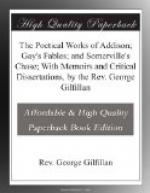Fable XII.—Pan and Fortune
Fable XIII.-Plutus, Cupid, and Time
Fable XIV.—The Owl, the
Swan, the Cock, the Spider, the Ass,
and the Farmer
Fable XV.—The Cook-maid, the Turnspit, and the Ox
Fable XVI.—The Ravens, the Sexton, and the Earth-worm
Songs:—
Sweet William’s Farewell to Black-eyed Susan
A Ballad, from the What-d’ye-call-it
SOMERVILLE’S CHASE.
THE LIFE OF WILLIAM SOMERVILLE
Somerville’s chase:—
Book I.
Book ii.
Book III.
Book IV.
LIFE OF JOSEPH ADDISON.
Joseph Addison, the Spectator, the true founder of our periodical literature, the finest, if not the greatest writer in the English language, was born at Milston, Wiltshire, on the 1st of May 1672. A fanciful mind might trace a correspondence between the particular months when celebrated men have been born and the peculiar complexion of their genius. Milton, the austere and awful, was born in the silent and gloomy month of December. Shakspeare, the most versatile of all writers, was born in April, that month of changeful skies, of sudden sunshine, and sudden showers. Burns and Byron, those stormy spirits, both appeared in the fierce January; and of the former, he himself says,
“‘Twas then a blast o’ Januar-win’
Blew welcome in on Robin.”
Scott, the broad sunny being, visited us in August, and in the same month the warm genius of Shelley came, as Hunt used to tell him, “from the planet Mercury” to our earth. Coleridge and Keats, with whose song a deep bar of sorrow was to mingle, like the music of falling leaves, or of winds wailing for the departure of summer, arrived in October,—that month, the beauty of which is the child of blasting, and its glory the flush of decay. And it seems somehow fitting that Addison, the mild, the quietly-joyous, the sanguine and serene, should come, with the daisy and the sweet summer-tide, on the 1st of May, which Buchanan thus hails—
“Salve fugacis gloria saeculi,
Salve secunda digna dies nota,
Salve vetustae vitae imago,
Et specimen venientis aevi.”
“Hail, glory of the fleeting year!
Hail, day, the fairest, happiest here!
Image of time for ever by,
Pledge of a bright eternity.”
Dr Lancelot Addison, himself a man of no mean note, was the father of our poet. He was born in 1632, at Maltesmeaburn, in the parish of Corby Ravensworth, (what a name of ill-omen within ill-omen, or as Dr Johnson would say, “inspissated gloom"!) in the county of Westmoreland. His father was a minister of the gospel; but in such humble circumstances, that Lancelot was received from the Grammar-school of Appleby into Queen’s College, Oxford, in




